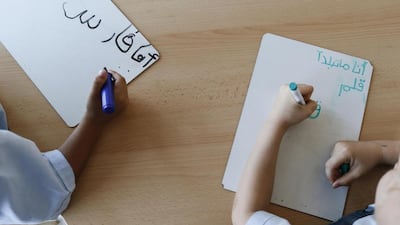The six official languages of the United Nations are Arabic, Chinese, English, French, Russian and Spanish.
Arabic, which was added in 1973, is the official language of more than 20 countries and the first language of over 290 million people living in a geographical area that stretches from south-west Asia to north-west Africa. It is also the liturgical language of 1.5 billion Muslims around the world. Yet it receives less than its due attention inside the UN.
Arabic conspicuously lacks parity with the other five official languages. Many documents are yet to be rendered in it – a look at the UN’s websites shows the depth of this disparity.
I have found several instances where Arabic is underrepresented on UN websites. These include the UN Conference on Trade and Development, which is primarily designed to maximise the trade, investment and development opportunities of developing countries and help them integrate into the world economy.
Since there is no language that suits all the world, global organisations need to devise communication strategies to address several target audiences. The UN is required to do so.
The dearth of access to information can affect the development of individuals and whole communities: it can limit social lives, it can lead to poverty and narrowness of vision and deprive people of their rights.
The relative absence of Arabic on UN websites limits their scope for informing Arabic-speaking communities. This could have a negative impact on the desired outcomes of the policies and actions undertaken by these organisations.
With an agenda that affects billions of people with distinctly different languages and cultures, the UN should give higher priority to its information strategies.
For many people, websites are the first source of information about these bodies. If very basic information is lacking, the organisation may fail to reach out to people and to deliver proper outcomes. Without proper communication, there can be no balanced development process.
It is also clear that social media platforms are able to propel messages to the public. Unfortunately, UN social media spaces don’t carry the same volume of information in Arabic as in languages such as English, French and Spanish.
The organisation should allocate extra funds to remove this imbalance among the official languages.
If the UN is unable to cover the full costs of this, it should ask its Arabic-speaking member countries to contribute towards the empowerment of their language.
Statistics concerning first-language use show that Chinese is the most commonly spoken of the UN official languages, followed by English and Spanish.
According to the language publication Ethnologue, Arabic, with 290 million first-language speakers, outnumbers French and Russian. But sources within the UN say that the use of Arabic does not even come close to that of French, which is the first language of around 77 million people worldwide.
The question is why the UN seems to be unable to put in place proper strategies to end the imbalance and to do so transparently.
The UAE has already made a generous financial contribution towards developing Arabic-language content within the UN system.
In 2014, the UAE and UN signed a memorandum on funding an Arabic version of Basic Facts about the United Nations. This book serves as a guide to the United Nations system and its agencies.
The question of further funding for Arabic content has to be settled satisfactorily, not just because Arabic has more first-language speakers than some other UN languages, but because Arabic is growing in importance in many ways.
Continual developments in the Arab world keep the region among the highest priorities on the UN agenda. Several territories of the Arabic linguistic zone face complex and interconnected challenges, ranging from poverty to civil war, displacements and refugee crises.
The UN needs to look within itself to ensure that a large part of its constituency is properly informed in its own language.
Muhammed Raeez is a doctoral candidate in New Delhi

